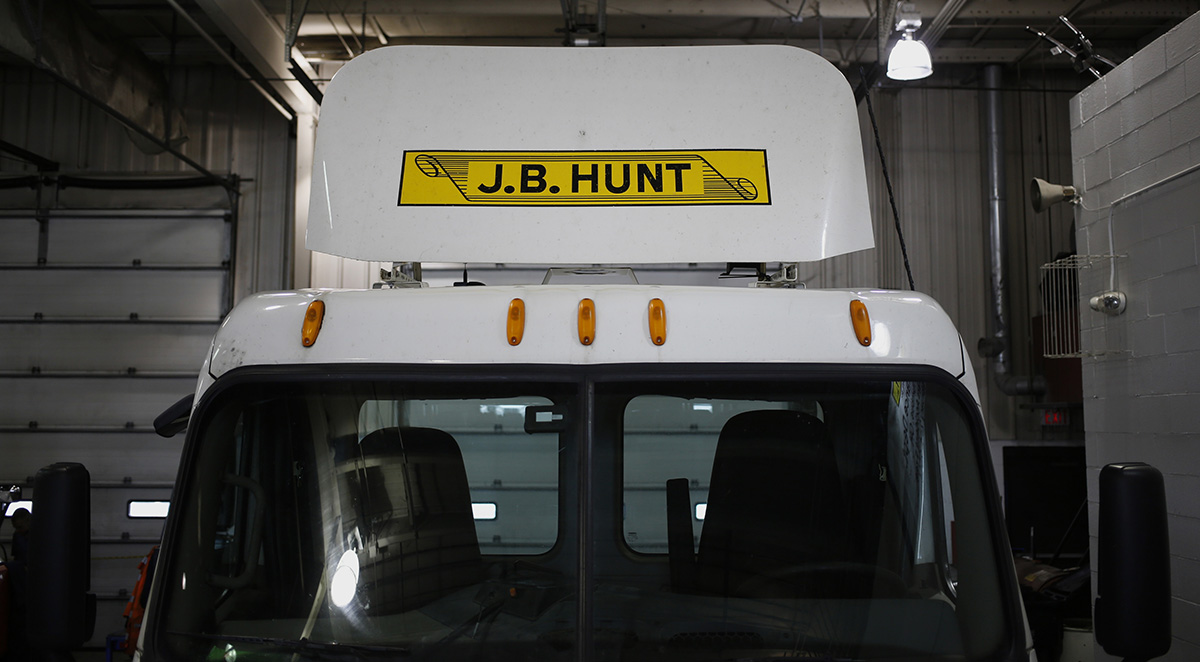J.B. Hunt Profits Up 2.6% Due to Lower Tax Bill in First Quarter

The truckload earnings season began with J.B. Hunt Transport Services Inc. announcing a 2.6% increase in profits year-over-year in the first quarter, mainly due to a one-time tax benefit that otherwise would have put the carrier behind 2016 earnings.
J.B. Hunt generated $102.7 million in profits for the first three months of 2017, or 92 cents per share. One year ago, J.B. Hunt earned $100.1 million in income, or 88 cents.
Revenue grew 6.6% to $1.63 billion in the quarter, although when fuel surcharges were excluded, the net was up only 2.5% to $1.46 billion.
Although the figures were positive, the carrier beat last year’s total only because its tax bill was $21.5 million less than one year ago. Otherwise, most of the company’s underlying results were weaker than expected, according to industry analysts.
J.B. Hunt, which is based in Lowell, Ark., ranks No. 4 on the Transport Topics Top 100 list of the largest U.S. and Canadian for-hire carriers.
“The effective income tax rate decreased to 28% in the current quarter compared [with] 38% in the first quarter 2016 due to a one-time after-tax benefit of $13.6 million or 12 cents per diluted share from the claiming of research and development tax credits and domestic production tax deductions incurred during the 2012 through 2016 tax years,” the company wrote in its earnings release.
If J.B. Hunt had paid the 38% tax rate this past quarter, then its net income would have been only $88.4 million. The company wrote that it expects an annual tax rate of 35% to 37%, which theoretically would have equaled about $92.7 million in profits in the first quarter without the one-time benefit.
“J.B. Hunt reported weaker than expected core earnings results, which, excluding a one-time tax benefit of 12 cents, missed our target by 3 cents and consensus by 5 cents,” wrote Citi Research analyst Christian Wetherbee. “Against a challenging [comparison in 2016,] load growth was weaker than expected, as competition with truck and other [intermodal marketing companies] in the East drove volume negative for the first time post-recession. Dedicated was the only segment to top our targets but posted flat [operating income] in spite of 10% revenue growth. Our sense is that investors were expecting weakness, but shares are likely to be pressured on weaker than expected intermodal volume.”
J.B. Hunt Intermodal, which accounts for about 57% of the overall business, generated $937 million in revenue for the first quarter, up 5% compared with early 2016. However, after costs were deducted from the revenue, the operating income fell 8% versus 2016 levels to $95 million. Overall intermodal loads grew 2% year-over-year as transcontinental [longhaul] loads grew 7% but eastern U.S. loads dropped 6%.
The company wrote that the struggles in the truckload market continue to plague intermodal.
“Benefits from volume growth were more than offset by lower revenue per load [excluding fuel surcharges], increases in rail purchased transportation costs, reduced Eastern network utilization and lower dray efficiency ... higher equipment ownership costs, increased driver wages and recruiting costs and increased insurance and claims costs,” the company wrote.
J.B. Hunt’s dedicated contract services, the second-biggest division, reported a 10% increase in revenue to $392 million, but operating income was flat at $45 million. Revenue per truck, per week, excluding fuel surcharges, went up about 1%, due in part to 392 additional trucks in the fleet than one year ago.
“The increased revenue and improved asset integration was offset by higher driver wages, increased insurance and claims cost primarily from weather-related accidents, higher health insurance costs and increased startup expenditures for new customer contracts,” the carrier wrote.
J.B. Hunt’s freight brokerage division reported a 14% increase in revenue to $209 million but a 59% drop in operating income to $4.5 million. The company blamed lower gross profit margins, higher insurance and a higher number of new sales offices opening up for the outcome.
“Startup branches typically produce less revenue and lower gross margins than mature branches (more than 2 years old) and therefore have a higher proportion of personnel costs to both total and net revenue,” according to the company.
J.B. Hunt’s truck division, the smallest unit, had a 2% drop in revenue to $94 million and a 46% decline in operating income to $4.9 million. While load counts increased 1%, the length of the average haul decreased 6%, and the rates per loaded mile were 1% lower than 2016. Contract rates were down 1.5% versus early 2016 prices. The company also wrote that equipment maintenance costs and higher insurance costs also made the first quarter less profitable than 2016.
Industry analysts had forecasted $97 million in profits or 86 cents for the quarter, according to a Bloomberg News consensus survey of analysts. Although J.B. Hunt came out 6 cents ahead, it missed the industry forecasts after excluding the 12 cent per share one-time tax benefit.




